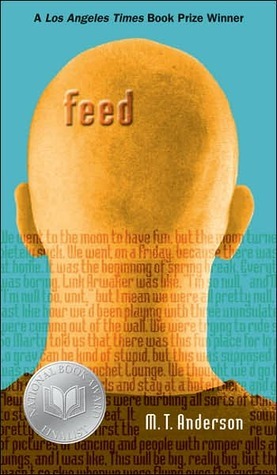TL;DR
M.T. Anderson's "Feed" explores a dystopian future where teenagers connect to the Internet through brain implants, exposing themes of identity, consumerism, and love against a backdrop of societal decay.

Get full Book
What is Feed about
"Feed" is set in a future where technology dominates human existence through brain implants known as feeds. The protagonist, Titus, and his friends experience a malfunction that strips them of their feeds, leading to an encounter with Violet, a girl who challenges the norms of their consumer-driven society. As their relationship develops, they navigate issues of identity and societal pressures, ultimately revealing the dark realities of their world, including pollution and class disparities. The novel serves as a satire of modern consumerism and technology's impact on human connections, drawing parallels to the works of Orwell and Vonnegut.
Feed 7 Key Takeaways
Titus and his friends plan a trip to the moon for spring break.
This trip symbolizes the escapism and frivolity that characterize the lives of the youth in this technologically saturated society.
The hacker disrupts their feeds, leaving them without the technology they depend on.
This event acts as a catalyst for the plot, forcing the characters to confront their reality and the implications of their dependency on technology.
Titus develops a relationship with Violet, who questions the feed's influence.
Violet represents a voice of dissent against the consumerist culture, bringing awareness to the dangers of their reliance on technology.
Titus's friends adapt to superficial trends, like artificial lesions.
This highlights the absurdity of their societal norms and the pressure to conform to consumer-driven identities.
Violet suffers permanent damage from the feed malfunction, affecting their relationship.
Her struggle embodies the consequences of living in a society obsessed with technology, contrasting with Titus's more apathetic outlook.
The climax occurs at a party where Violet's health deteriorates.
This moment crystallizes the tension between personal connection and societal expectations, showcasing the fragility of their existence.
The story concludes with Violet in a vegetative state and Titus visiting her.
The ending emphasizes the bleak reality of their world, where personal relationships are overshadowed by societal decay and technological failure.
Top Feed Quotes
- "The feed was the best thing that ever happened to us, and then it was the worst."
- "I want the world, but I want it to be real."
- "It’s not a matter of choosing truth or lies; it’s about who gets to create them."
Who should read Feed?
"Feed" is ideal for readers who are interested in dystopian literature, technology's impact on society, and young adult themes. Those who enjoy thought-provoking narratives that challenge societal norms and explore the intricacies of identity and connection will find this book particularly engaging.
Feed Best Reviews
- Anderson's "Feed" is a thought-provoking and darkly humorous exploration of consumerism and technology, drawing readers into a world that is both stunningly imaginative and eerily familiar.
- A sharp and savage satire that captures the essence of modern society, "Feed" resonates deeply with anyone navigating the complexities of identity in a tech-driven world.
People also liked these summaries
Feed FAQs
What are the major themes of "Feed"?
The major themes of "Feed" include consumerism, technology's influence on identity, and the challenges of genuine human connection in a digitized world.
Is "Feed" suitable for young adult readers?
Yes, "Feed" is categorized as young adult fiction and addresses themes relevant to teenagers, including love, societal pressure, and the impact of technology on self-identity.
How does the book reflect current societal issues?
"Feed" serves as a cautionary tale about the dangers of unchecked consumerism and technology, mirroring contemporary concerns over privacy, identity, and the consequences of a digital society.